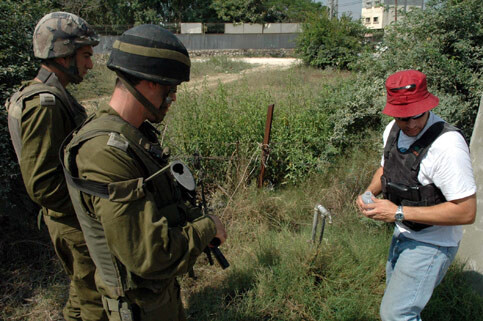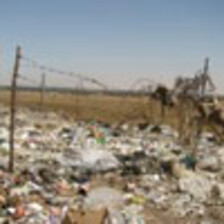The Electronic Intifada 26 May 2009

Workers from the Israeli water authority backed by armed soldiers take water samples in the occupied West Bank town of Qalqiliya. (Khaleel Reash/MaanImages)
Friends of the Earth Middle East (FoEME) is calling for the replacement of committees, which control the West Bank’s water, for having “failed both sides” with “catastrophic” consequences.
“It is time to replace the failed mechanism of the Joint Water Committees established under Oslo [the peace accords of the mid-1990s], with an institution where Palestinians and Israelis are true partners in both water supply and management responsibilities,” said Nader Khateeb, the Palestinian Director of FoEME. This denouncement follows a recently published World Bank report which also found that the Joint Water Committees (JWC) “fall short of the needs of the Palestinian people.”
Established under the Oslo accords, the JWC was set up specifically to oversee management of shared aquifers and to ensure that the West Bank and Gaza Strip received extra water accorded to them under the agreement. Palestinians and Israelis were intended to be equal partners working towards integrated water management and infrastructure. In reality, however, the JWC simply entrenched Israeli influence over the West Bank’s water resources and introduced a complex permit system that has severely limited water development projects ever since.
Alice Gray, a former water consultant in the West Bank, said that the most significant impact of the Israeli occupation on the Palestinian environment has been the suspension of development. “My job at the time was basically to tell people all the reasons that they probably wouldn’t be able to implement their project,” she explained. “The reason that they [projects] are not built is because in order to build them under the Oslo accord, you need permission from the Joint Water Committees — that’s one big problem already.”
Out of $121 million worth of Palestinian projects presented to JWC in 2001-2008, only half (or $60.4 million) were approved and only a third have been implemented or begun implementation. The World Bank also reported that 106 water projects and 12 large-scale waste-water projects are still awaiting JWC approval, some of them since 1999.
These startling statistics are all the more unsettling when compared with Israeli-proposed projects for development in the West Bank, where all but one have been swiftly approved by the JWC. Decisions made by the JWC are in theory based on consensual agreement between the two parties, yet the World Bank’s report openly acknowledges that Israel alone has virtual veto power on all water issues.
In the West Bank, when plans are being drawn up for vital water infrastructure such as waste-water plants, the only space that is generally available is in Area C (which is 60 percent of the West Bank and is under total Israeli military control). So finding enough land that is at an “acceptable” distance from walls, checkpoints and even future Israeli settlements is another obstacle that projects need to overcome. Even when this condition is met, other complications with Israeli settlements arise.
Water consultant Alice Gray said, “When the Palestinians go to the Israeli authorities to ask for a permit to build a sewage treatment plant for their town, the Israelis say sure, but you also have to network and treat the sewage of the Israeli settlements.”
She added, “The Palestinian position then generally would be no, they are not happy with that because if you build infrastructure for settlements then you are contributing to their entrenchment — it’s like admitting that they have a right to be there. So politically it’s a nightmare.”
Overcoming these constraints has proven so difficult that only one in seven proposed waste-water treatment plants is actually operational, and consequently only 31 percent of Palestinians are connected to a sewage network.
The underdevelopment of the West Bank’s water infrastructure has a direct impact on the daily lives of Palestinians who face high costs and low quality water resources. Overall, Palestinians spend around eight percent of household expenditure on water, which is twice the globally-accepted standard. In addition, the poorest spend up to one-sixth of their household budget or more on providing clean water for their family.
By regional standards Palestinians have among the lowest access to fresh water, forcing Palestinian communities to engage in unlicensed drilling simply to obtain drinking water. The Israeli Water Authority has used its de facto role as regulator to prevent Palestinians drilling for water, despite growing demand from Palestinian consumers. Meanwhile, Israel has increased its own off-take from the aquifer above the agreed levels. This practice allows Israeli citizens, including settlers in the West Bank, to consume four times more fresh water per capita as Palestinians living in the West Bank.
The World Bank also found that although Palestinian agriculture accounts for a bigger share of economic output and overall employment in comparison to Israel, the Palestinian per capita water budget for agriculture is one-fifth of Israel’s.
“You are dealing with a situation of vast inequality,” Gray asserts. “In terms of the water situation, it is not experienced in the same way by Israelis and Palestinians … and that creates a very different scenario for those Israeli farmers who have access to subsidized water and so never have to deal with the situation in the same way as Palestinian farmers.”
As it stands, irrigated agriculture is an important economic sector in Palestine, contributing about 12 percent of the gross domestic product (GDP) and employing 117,000 people, according to the World Bank. Improved water resources would enable agriculture to play a key economic, social and political role in rebuilding the Palestinian economy. The World Bank’s report, “West Bank and Gaza: Assessment of Restrictions on Palestinian Water Sector Development,” states that “the cost to the economy of foregone opportunity in irrigated agriculture is significant, with upper bound preliminary estimates that could be as high as 10 percent of GDP and 110,000 jobs.”
Taken together, the implications caused by restrictions from the JWC are hard to ignore. Not only is it limiting the development of vital infrastructure within Palestine, it’s reducing the Palestinians’ quality of life and crippling economic growth. As Khateeb, the FoEME Palestinian Director, explained, “After 15 years of JWC failure … It’s urgent to free the water sector and water needs of both peoples from the conflict.”
Arwa Aburawa (http://arwafreelance.wordpress.com/) is a freelance journalist based in the UK.




